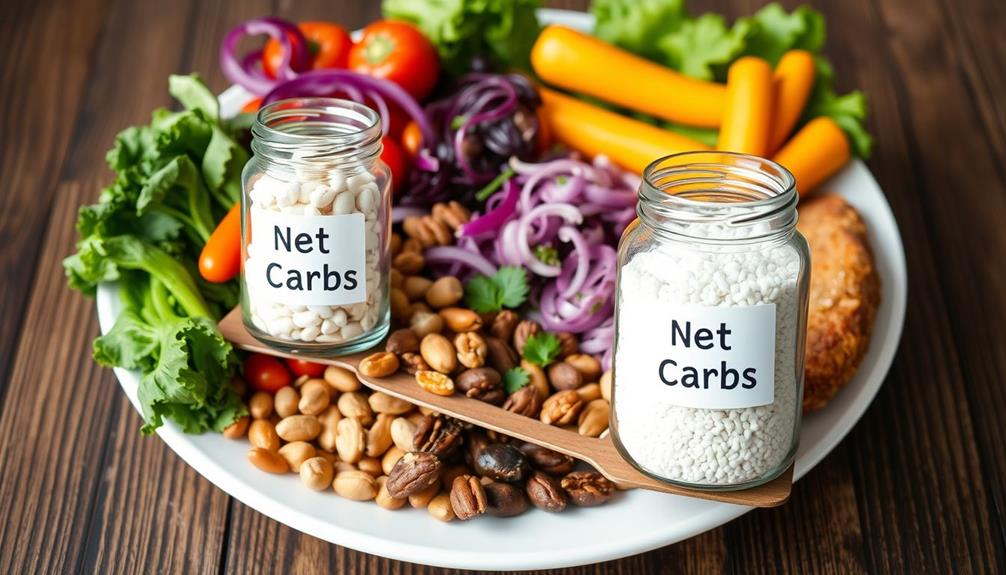Revealing the secrets of net carbs can transform how you manage your diet. To find net carbs, subtract fiber and sugar alcohols from total carbohydrates. This calculation helps you focus on the carbs that impact your blood sugar. You don't have to eliminate carbs entirely; understanding net carbs allows you to enjoy fiber-rich foods and stay on track with your health goals. Using net carb calculators makes tracking effortless. This approach not only supports weight loss but also promotes overall well-being. Stick around, and you'll discover more insights into optimizing your carb intake for a healthier lifestyle. Understanding net carbs can also shed light on the role of dairy in nutrition. By paying attention to net carbs, you can make informed choices about incorporating dairy products into your diet. This knowledge can help you balance your macronutrient intake and make the most of the nutritional benefits that dairy has to offer. Whether you’re aiming for weight loss or simply seeking a healthier lifestyle, knowing the impact of net carbs and the role of dairy in nutrition can be a game-changer.
Key Takeaways
- Net carbs are calculated by subtracting fiber and certain sugar alcohols from total carbohydrates, helping manage blood sugar levels.
- Understanding net carbs allows for enjoyment of fiber-rich foods essential for gut health while maintaining ketosis.
- Not all carbohydrates affect blood sugar equally; fiber does not count towards net carbs.
- Utilizing a net carb calculator simplifies tracking and enables a diverse diet while adhering to low-carb goals.
- Accurate monitoring of net carbs supports weight loss, improves insulin sensitivity, and enhances overall health.
What Are Net Carbs?

When you're following a ketogenic diet, understanding net carbs is essential to staying within your carbohydrate limits.
Net carbs are the carbohydrates that actually affect your blood sugar levels. You calculate them by subtracting dietary fiber and sugar alcohols from total carbohydrates (Net carbs = Total carbs – Fiber – Sugar alcohols).
This is important because fiber doesn't impact your glucose levels, and certain sugar alcohols have minimal effects too.
By focusing on net carbs, you can enjoy a variety of foods while keeping your carb intake in check.
Using net carb calculators can simplify your tracking, making it easier to adhere to your ketogenic lifestyle.
This way, you can make informed choices and stay on track with your dietary goals.
Importance of Net Carbs

Understanding the importance of net carbs is essential for anyone on a ketogenic diet. By focusing on net carbs, you can effectively manage your carbohydrate intake without feeling deprived.
This approach allows you to enjoy fiber-rich foods that promote gut health while minimizing the impact on your blood sugar levels.
Net carbs help you stay within your daily limits, which is vital for maintaining ketosis and achieving your weight loss goals. They also enable you to enjoy a variety of foods, making your diet sustainable and enjoyable.
How to Calculate Net Carbs

Calculating net carbs is a straightforward process that can greatly enhance your ketogenic diet experience. To determine net carbs, simply subtract dietary fiber and sugar alcohols from the total carbohydrates. Here's a quick reference:
| Component | Example (per serving) |
|---|---|
| Total Carbohydrates | 20g |
| Dietary Fiber | 5g |
| Sugar Alcohols | 2g |
| Net Carbs | 13g |
This calculation helps you accurately monitor your carb intake, ensuring you're within your daily limits. By focusing on net carbs, you can enjoy a wider variety of foods while maintaining ketosis. Plus, using net carb calculators can simplify tracking and make your keto journey more enjoyable.
Common Misconceptions About Net Carbs

Many people mistakenly believe that all carbohydrates are created equal, leading to confusion about the concept of net carbs. One common misconception is that all fiber should be counted in total carbs, but fiber actually doesn't affect blood sugar.
You might also think that sugar alcohols are always safe, but some can still impact your glucose levels. Additionally, some folks assume that a low-carb diet means eliminating all carbs, when in fact, it's about managing your intake.
Best Low-Carb Foods

Having a clear grasp of net carbs helps you make smarter food choices on your keto journey. Incorporating low-carb foods into your meals can keep you satisfied while ensuring you stay within your carb limits. Here are some of the best options:
| Category | Foods | Net Carbs (per 100g) |
|---|---|---|
| Vegetables | Spinach, Kale, Zucchini | 1-3 |
| Healthy Fats | Avocado, Olive Oil, Nuts | 0-2 |
| Proteins | Chicken, Beef, Eggs | 0-0.5 |
| Low-GI Fruits | Raspberries, Strawberries | 5-7 |
Tips for Tracking Net Carbs
Tracking net carbs effectively can transform your keto journey and help you stay on course.
First, invest in a reliable food scale and measuring cups to accurately portion your food. Use a net carb calculator or app to make calculations easier—subtract fiber and sugar alcohols from total carbs.
Keep a food diary to document everything you eat; this helps identify patterns and adjust your intake as needed. Focus on whole foods, and read labels carefully to spot hidden carbs.
Finally, meal prep your meals in advance to avoid impulse eating and guarantee you stay within your carb limits.
Impact on Health and Weight Loss

The ketogenic diet's impact on health and weight loss is profound, often leading to transformative results for those who commit to it. By drastically reducing carbohydrate intake, you encourage your body to enter ketosis, where it burns fat for energy.
This process not only accelerates weight loss but also stabilizes blood sugar levels, improving insulin sensitivity. You'll likely experience increased energy and mental clarity as your body adapts.
Additionally, the anti-inflammatory properties of healthy fats can alleviate chronic issues, enhancing overall wellness. As you track your net carbs, you'll find it easier to enjoy delicious foods while still reaping the weight loss and health benefits.
Embracing this lifestyle can reveal a healthier, more energetic you.
Frequently Asked Questions
Can I Consume Alcohol While Tracking Net Carbs?
Yes, you can enjoy alcohol while tracking net carbs. Just choose low-carb options like dry wines or spirits mixed with soda water, and always check the carb content to stay within your limits.
How Do Net Carbs Differ From Total Carbohydrates?
Imagine you're a detective, solving the mystery of carbs. Net carbs focus on the carbs your body processes, subtracting fiber and sugar alcohols, while total carbs include everything. You need to track net carbs for keto success.
Are There Specific Foods That Are Zero Net Carbs?
Yes, certain foods can be considered zero net carbs, like leafy greens, cucumbers, and some mushrooms. You can enjoy these in your meals while still adhering to your low-carb lifestyle without impacting your carb limits.
Can Net Carbs Affect My Workout Performance?
Like a car running on empty, your workout performance can suffer if your net carbs are too low. They provide essential energy, so make certain you balance your intake for peak strength and endurance during workouts.
How Often Should I Recalculate My Net Carbs?
You should recalculate your net carbs regularly, especially when changing your diet or activity level. Doing this weekly or bi-weekly helps you stay on track, ensuring your carb intake aligns with your health goals effectively.
Conclusion
Incorporating net carbs into your ketogenic journey is essential for achieving your health goals. Did you know that a study found individuals who tracked their net carb intake lost an average of 2.5 times more weight than those who didn't? By understanding and calculating net carbs, you can make smarter food choices and stay on track. Embrace this knowledge, and you'll access the full potential of your keto diet, paving the way for lasting success and improved well-being.









